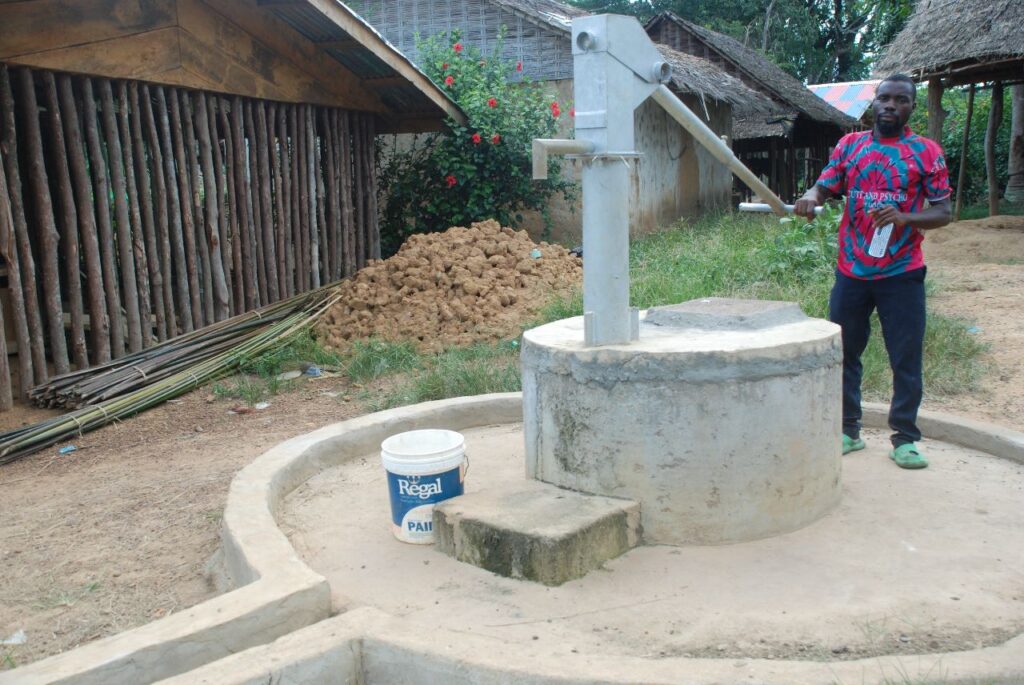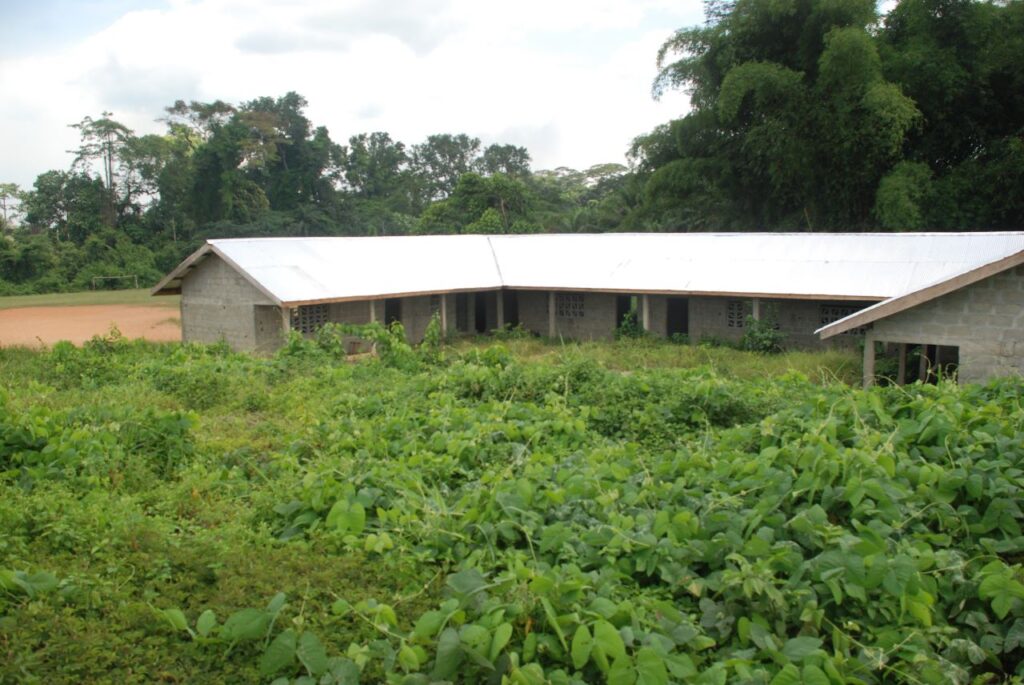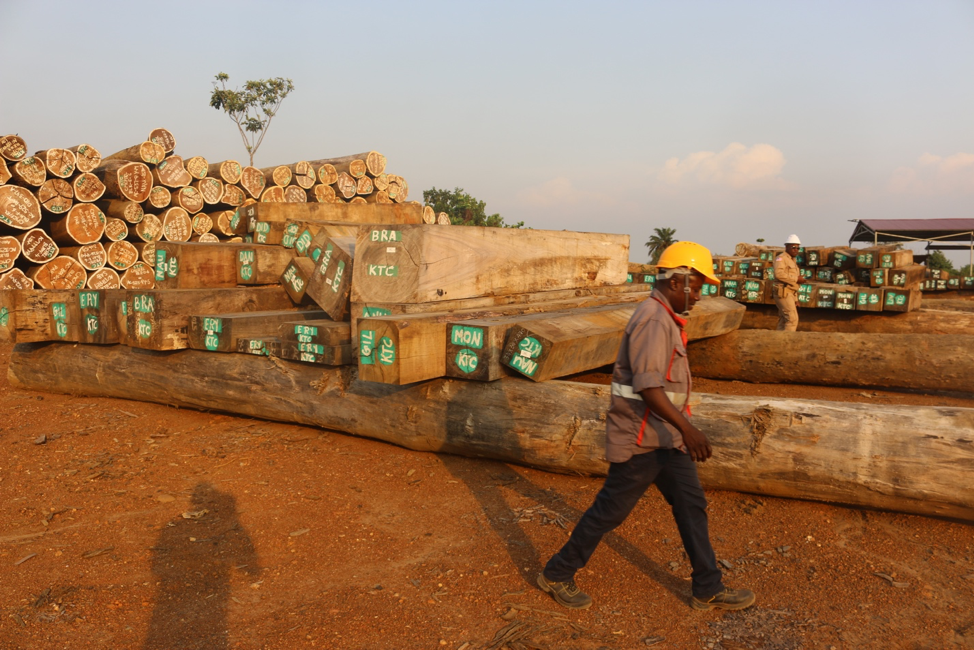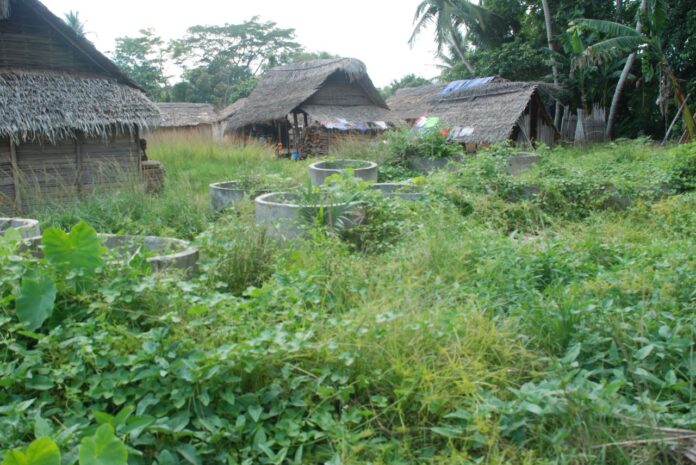Top: Grass-covered culverts meant to construct handpumps for communities adjacent to the Central Morweh Community Forest. The DayLight/Gabriel M. Dixon
By Gabriel M. Dixon
BOEGEEZAY TOWN, River Cess – Cracks have started to emerge in this new logging agreement in southcentral Liberia.
Central Morweh Community Forest signed a contract with the Kisvan Timber Corporation In March 2021. To harvest logs in a 19,091-hectare forest, The company promised the villagers safe drinking water, roads, support for healthcare, and a school. It also promised to pay fees for harvesting and the use of the community’s land.
Now three years after the contract, Kisvan has yet to complete the handpumps, and schools and provide fees for clinics. It has outstanding payments for land rental and harvesting, according to the villagers.
“The time should have been last year December with the company for the completion of the hand pumps and the school,” said Clinton Cephus, head of the community’s forest leadership.
“From 2022 to this year we have not received scholarship benefits, [and]… this year we have yet to receive payment for land rental fees,” he said.
As part of their February 2021 agreement, the company agreed to construct a road from Boegeezay Town to Sameria Town, and three metal or concrete bridges over the Duahn, Guahn, and Nepu creeks.
The road from Boegeezay to Sameria should have been completed in December 2022, and the construction of the three bridges next year.
Kisvan also agreed to complete 16 handpumps and a 10-classroom school and offices in the first year of the contract from February 2021 to December 2022.
Apart from infrastructure, the company agreed to provide an annual scholarship fund of US$6,000 and healthcare services support of US$5,000.
The contract also requires the company to pay another US$6,000 per quarter for the services of community forest guards.
Van Ngo, the CEO of Kisvan, admits the projects are yet to be completed.
“This season, we started very late (middle of February) due to the very down market. We are doing our best to keep up with the social commitments and our operations,” Mr. Ngo tells The DayLight via email.
That was the exact opposite of what he claimed back in March in an interview in Kisvan’s log yard in Buchanan, Grand Bassa. Except for the school, claimed then every project. “We are always committed and we are always on top of it to ensure that we working well with them,” Mr. Ngo said at the time.
Amid his admittance, Mr. Ngo claims the company has done better than what Cephus and the villagers allege. He says Kisvan has completed 75 percent of a school project in Kporkon. This reporter saw the unfinished school building in Kporkon but could not independently verify Mr. Ngo’s claim.

Mr. Ngo denies his company had outstanding payments to villagers. He claimed he paid all the fees as of last year without showing any evidence of the payments.
Mr. Ngo also claims the company has completed 50 percent of the handpumps and the community “appreciates” a 35-meter log bridge there. The villagers we interviewed did not give that impression.
Villagers say the school is substandard for a US$40,000 project. They say the project has no blueprint, there was no bidding process for the contractor and Cephus did not consult them.
Cephus concedes to those claims. “It (selection of company) was done through the [community forest leadership’s] office, which needed not to have been so,” he says.
Kisvan also owes the community one year in land rental and scholarship fees, according to Cephus, and has not paid any money for harvesting.

The Forestry Development Authority (FDA) did not grant The DayLight access to Kisvan’s exports. The company also did not provide that information upon our request. Their denial violates a number of forestry laws and regulations.
Cephus claims the company has shipped some 5,700 cubic meters of logs but did not provide any proof.
Mr. Ngo said back in March that “We have 2,000 cubic meters of logs” at Kisvan’s log yard. The DayLight photographed several of the logs, marked with “KTC,” the company’s industry-recognized abbreviation. Some were in squared form.
Mr. Ngo’s comments in that March interview indicate Kisvan exported logs. At one point, he complained that it was expensive to export timber in containers through the Freeport of Monrovia.
The Forestry Development Authority breaks its regulation by permitting Kisvan to export logs while it remains indebted to Central Morweh. The Regulation on Forest Fees prohibits the FDA from granting companies with debt export permits. The agency did not respond to questions on the matter.
Roadblocks and ‘Devil’
In forestry, communities sign a forest management agreement with the FDA for 15 years, subject to a five-year review. Thereafter, they can enter logging agreements with third parties. The scheme is meant to share forest benefits with locals.
But the signs of the failure two years into their agreement with Kisvan, villagers in Central Morweh are concerned whether they would benefit from their forest.
“The community [is] vexed now and asked the… the leadership to call the company to tell them what they’re doing is not going down well with us,” says Sarah Neegar, a member of the community assembly from Kporkon Town. The community assembly comprises representatives of towns and villages that own the forest and is the highest decision-making body in community forestry.

“We told the [leadership] to call the company so we can discuss with them but since that time they can’t come,” adds Neegar.
“If the company [doesn’t] come, we will put a roadblock, to put our Bassa devil and be dancing. Then now somebody will come in.” Devil is the Liberian parlance for a traditional mask dancer whose outing could connote celebration or chaos.
Neegar’s comments are echoed by Junior Gbatea, the youth chairman of Kporkon Town.
Cephus shrugged off any threat of a protest. “Well, I don’t know their thinking because every individual has his/her own understanding or doing things,” he tells The DayLight.
His comments align with the Community Rights Law of 2009 with Respect to Forest Land. The law lays down specific ways forest communities can seek redress, and none has to do with protest or violence.

